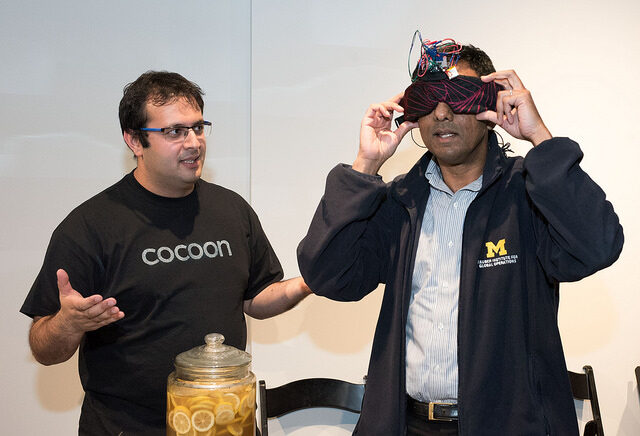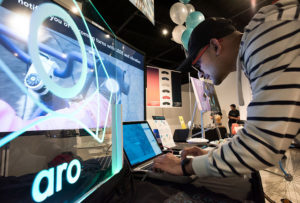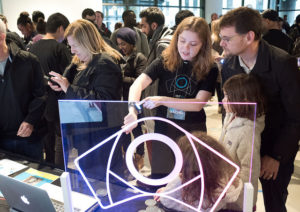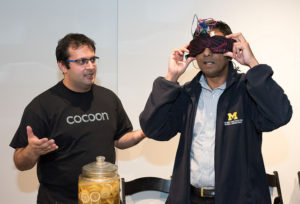
For more than 20 years, the Integrated Product Development course has brought together students and faculty members from different disciplines at the University of Michigan to participate in an innovative product design competition.
The culmination of this year’s course was the 2017 IPD Trade Show, which took place in April and featured an exhibition of products from six teams of U-M students from the Stamps School of Art & Design, College of Engineering, School of Information and Ross School of Business.
Each team was required to have at least one member from the four schools in order to work through a variety of important elements of product development—including the process of market research, concept generation and selection, technical development, production process design, pricing, inventory stocking and advertising.
The course, organized by the Tauber Institute for Global Operations, is co-taught by Stephanie Tharp, associate professor at the Stamps School, and Ross School lecturer Evan Svaan.
For each course, they come up with a specific product class for the students to focus on. This year, they challenged teams to create a “fully functional, customer-ready accessory that can be worn routinely in daily life, incorporates the use of active technology, and is responsive to user needs in an innovative way.”
Both Tharp and Svaan emphasized the uniqueness of the course structure in helping students work with others outside their disciplines.
“It’s very loosely framed, so the teams completely control the project space that they’re working in,” Tharp said. “It’s very hands on, and there’s a lot of prototyping that allows them to work through their ideas in a physical way. They come in with very different experiences and perspectives—sometimes it gels really well and other times there are challenges in working through a given project.”
According to Svaan, although the business school has many opportunities for students to do fieldwork with existing companies, this course offers a unique, active learning experience specifically involving business startups.
“This is a prime opportunity for our students from the business school to engage with engineers, information specialists, and most critically, designers from the Stamps School of Art and Design,” he said. “We’re trying to teach them that there are many needs that exist out there in the world—unfilled needs for creative products—that can be realized by a team-based approach.”
Svaan said that although challenges often arise, the results at the end of the term are astounding.
For example, Team Guava, who won the onsite vote at the IPD Trade Show this year, developed “Aro,” a wristband to help cyclists and runners navigate and communicate their next movements with others using LED lights.
According to Jon Garrison, Team Guava member and Ross MBA student, the toughest part of the class was the blank canvas they had to start with at the beginning.
“When we first got together and started thinking about what we wanted to do, all we knew was that it had to be a wearable and that it had to fit certain criteria,” said Garrison. “So we didn’t really constrain ourselves at all—we started applying general filters to refine our ideas. And those filters were primarily ‘Is this a problem worth solving?'”
Ultimately, their idea came from observing that many cyclists try to use their phones for navigation—coupled with the constant need for them to be more visible to surrounding cars and cyclists.
Julie Cruz, another member of Team Guava and graduate student in the School of Information, said that getting their ideas from the drawing board to the prototype was the most important part of the process—and it took help from every team member.
“My work in information studies always seems to be tied to a certain processes—we’re always asking ourselves ‘Is it functional and is it user friendly?'” Cruz said. “But at the end of the day, a product is desired because of its aesthetic, and users are also drawn to the stylistic statement that they’re making when they are thinking about buying or investing in a certain product.”
In addition to Team Guava’s “Aro,” the 2017 IPD Trade Show featured other products like “Cocoon,” a smart sleep mask; “Scorpion,” a smart bike lock; “Stil,” a personal stress management wristband; “Sunban,” a wristband that provides an easy way to track sun exposure; and “SoSafe,” a discrete device that allows you to communicate with friends when you’re in trouble.
The teams first pitched their products online, where visitors could spend a set amount of money to purchase products they were interested in buying. After the initial online product launch, students adjusted pricing to market remaining inventory at the trade show.
Tech enthusiasts from throughout the Michigan community gathered at the new Stamps Gallery in downtown Ann Arbor to test prototypes and vote for the products they would most like to purchase.
According to sales and votes, “Aro,” “Scorpion” and “Sunban” finished at the top of this year’s class.





